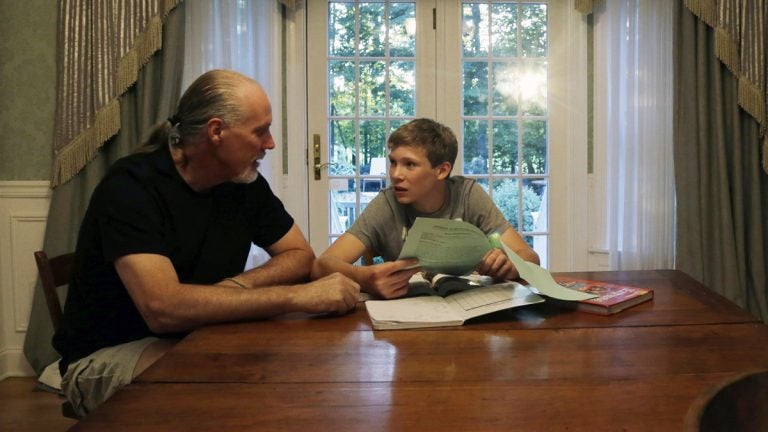Divided reactions to court decision on PARCC and what it means for students
Path to graduation still uncertain for about 170,000 high school seniors and juniors, but ‘business as usual’ for many school officials who continue to implement PARCC.

Will Richardson (left) and his son Tucker at their home in Flemington, N.J. Tucker's parents, Wendy and Will, are part of a small but growing number of parents nationwide who are ensuring their children do not participate in standardized testing. (AP Photo/Mel Evans)
This story originally appeared on NJ Spotlight.
—
School officials, advocates, parents and legislators are divided on how the state should react to the recent state appellate court decision that throws out the use of PARCC testing as a graduation requirement.
Because of the ruling, current New Jersey high school students have no clear guidance on what will be necessary to obtain a diploma. And it’s unclear that whatever remedy is chosen, it will be soon enough to fairly determine the future of about 170,000 current high school seniors and juniors.
As a result, a new response to the current court case is asking for all testing to be eliminated as a graduation requirement. The Legislature, on the other hand, is considering a stop-gap measure to allow PARCC scores to be used as a graduation requirement for the next two years. (This would cover seniors who are graduating this year and juniors who have already started applying for college.)
Meanwhile, school officials say they are doing the only thing they can do — moving forward as if nothing will change and that the graduation requirements in place at the start of the school year will remain. The state Department of Education has instructed schools to continue administering PARCC exams on schedule and await further instruction.
“For us, it’s business as usual,” Paterson schools superintendent Eileen Shafer said. “We’re moving along as we have in the past, getting ready to implement PARCC and at this point it will be considered a graduation requirement until we hear differently.”
In a December decision, a three-panel state appellate court issued a ruling striking down the use of PARCC (Partnership for Assessment of Readiness for College and Careers) as a graduation requirement — a policy that had been established by a Board of Education vote in 2016.
New Jersey has required passing a skills test in order to graduate since the 1970’s. But the use of PARCC, which can be taken in several years of high school starting freshman year has been particularly controversial, with critics complaining that it is poorly designed and takes too much time to administer. What’s more, in the class of 2017, less than 30 percent of graduates passed both the required Algebra 1 and the 10th grade language arts tests. In 2018, passing rates on 10th grade English and Algebra I were 52 percent and 46 percent respectively. The ELC estimates that thousands of students in the classes of 2019 and 2020 have not met the PARCC graduation assessment requirements at all. Under Gov. Phil Murphy, the DOE plans to eliminate PARCC, but the state was to continue its use until a replacement plan could be developed.
No consensus on a short-term fix
The appellate court decision upset that plan, but there is no consensus on what to do in the short term. At issue is whether to use the test at all, use it only for the next two years, or use it for all current high school students who have already started preparing for graduation.
The Education Law Center — the primary appellant in the current court case — recently asked the court to either waive the use of the test entirely or keep it in place until 2023, which would cover all current high school students.
“The DOE has placed the graduation of thousands of current high school students at risk,” the ELC filing stated.
The ELC, which brought the original challenge to court, has said the 2016 Board of Education vote for the use of PARCC was a violation of the legislative intent of the state statute for there to be one assessment administered in the 11th grade, not two exams that can be taken in any number of years.
The aappellate court agreed with the ELC. Now, the ELC is asking for relief for all high school students. “This includes approximately 30,000-35,000 students in the junior and senior classes who had not yet met the requirement, thousands more who had only partially satisfied it, and an unknown number of the roughly 200,000 sophomores and freshmen who have yet to satisfy the requirement,” the ELC’s motion reads.
Suggestions from lawmakers
As the court is reviewing responses from both the ELC and the state, some legislative fixes have been proposed and quickly put on hold.
Legislative education committee chairs Sen. Teresa Ruiz (D-Essex) and Assemblywoman Pamela Lampitt (D-Camden) have put forth a bill (S-3381)they say would codify a state Board of Education vote to keep the PARCC graduation requirements in place for juniors and seniors without violating state statute. That bill was expected to be heard in committee last week but was held off at the administration’s request. Though Ruiz said the bill would “eliminate chaos and confusion” in the immediate future by aligning state law with the BOE vote, opponents of this bill say it goes too far and does not offer enough clarity.
“Ruiz’s bill is the most extreme way to go about this,“ Julie Borst, executive director of parent advocacy group Save our Schools, said. She argued that the bill would “fundamentally change New Jersey’s law” and that before something like it could pass, there should be public hearings.
Borst said her organization instead supports a competing measure (A-672) that would temporarily suspend graduation testing requirements and give the state, parents, and students “a chance to catch their breath,” hold hearings and develop alternative assessments. That bill has received much support from advocacy groups but has seen little movement in the Legislature as the committee chairs in both houses support Ruiz’s measure.
But opinions on the issue of whether or not to require passing PARCC to graduate have changed dramatically over the past few years, even as the players have remained the same.
In violation of state law?
Two years ago, both the Assembly — in a 69-3 vote on A-215 — along with Senate President Steve Sweeney and Ruiz declared that the existing graduation rules mandating PARCC were in violation of state law. Sweeney and Ruiz sent a letter to the BOE that read: “Clearly, the State Board of Education’s revised regulation governing the assessments required to demonstrate proficiency for high school graduation is inconsistent with and violates the intent of the Legislature in its passage,” adding, “We urge the State Board of Education to revise its regulation to bring [it] in line with legislative intent.”
However, no attempt was made to revise the language of the state’s graduation requirement statute or reconcile it with DOE regulations. Until now.
Still, despite the confusion, few of the school administrators contacted for this story expressed concern.
“Past experience has been that the NJDOE has made provisions to ensure that graduation is attainable for all students when changes have occurred,” Estee Mailot, test coordinator for Toms River Public Schools wrote in an email.
In Millburn, school officials have taken proactive measures in case the exit exam requirements remain in place. “We had all students who had not completed the PARCC requirements for graduation take the test in November,” Nancy Dries, communications coordinator for Millburn schools said. “This year’s graduating class is in compliance with the requirements as currently set in statute.”
Necessary to maintain status quo
For Shafer, and those in Paterson, maintaining the status quo is necessary to avoid mass panic, she said. Paterson Public Schools are scheduled for a district-wide practice PARCC session in two weeks to make sure that not only are the students prepared, but the test coordinators are ready, and the technology is operational.
“The minute you talk to anybody and you say it’s up in the air and it may not count, the way the kids internalize that is ‘I don’t have to try real hard or study,’ and we want to stay away from that,” Shafer said.
Jazmin Rotger de Parra, director of Paterson’s division of assessment, planning and evaluation said the process of preparing students and administrators to take PARCC is so intensive that they can’t afford to make any assumptions that it’ll go away. She said preparations begin in September to get students up to speed curriculum-wise, and get their information in the system to track their progress and make sure they’re getting the correct assessment as some students with special needs receive different versions of the test, are allowed more time to take the test, or require other specific accommodations.
“We have to make sure that even though they haven’t provided the guidance yet, we have to take a ‘better safe than sorry’ approach and be sure that we’re prepared,” she said. “It’s much easier to remove students and unassign them from the system than go through the whole process again trying to add back over two thousand students.”
For Julie Borst, who said she hears from worried parents on a regular basis, it’s not a question of whether students will get their diplomas this year, but how the rules will change for future graduates.
“Yes, kids are going to graduate, there’s no way the governor is going to not graduate those students, that’s not going to happen,” said Borst. The future is the issue, she said. “We are the stakeholders, it is our children we’re talking about. We want tests that are reliable and valid and will be used appropriately, we don’t want people punished for them.”
WHYY is your source for fact-based, in-depth journalism and information. As a nonprofit organization, we rely on financial support from readers like you. Please give today.



